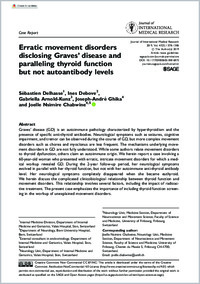Erratic movement disorders disclosing Graves’ disease and paralleling thyroid function but not autoantibody levels
- Delhasse, Sébastien Internal Medicine Division, Department of Internal Medicine and Geriatrics, Valais Hospital, Sion, Switzerland
- Debove, Ines Department of Neurology, Bern University Hospital, Bern, Switzerland
- Arnold-Kunz, Gabriella External consultant in endocrinology
- Ghika, Joseph-André Neurology Unit, Department of Internal Medicine and Geriatrics, Valais Hospital, Sion, Switzerland
- Chabwine, Joelle N. Neurology Unit, Department of Internal Medicine and Geriatrics, Valais Hospital, Sion, Switzerland - Neurology Unit, Medicine Section, Department of Neuroscience and Movement Science, Faculty of Science and Medicine, University of Fribourg, Fribourg, Switzerland
-
01.03.2019
Published in:
- Journal of International Medical Research. - 2019, vol. 47, no. 3, p. 1378–1386
English
Graves’ disease (GD) is an autoimmune pathology characterized by hyperthyroidism and the presence of specific anti-thyroid antibodies. Neurological symptoms such as seizures, cognitive impairment, and tremor can be observed during the course of GD, but more complex movement disorders such as chorea and myoclonus are less frequent. The mechanisms underlying movement disorders in GD are not fully understood. While some authors relate movement disorders to thyroid dysfunction, others claim an autoimmune origin. We herein report a case involving a 60-year-old woman who presented with erratic, intricate movement disorders for which a medical workup revealed GD. During the 2-year follow-up period, her neurological symptoms evolved in parallel with her thyroid function, but not with her autoimmune anti-thyroid antibody level. Her neurological symptoms completely disappeared when she became euthyroid. We herein discuss the complicated clinicobiological relationship between thyroid function and movement disorders. This relationship involves several factors, including the impact of radioactive treatment. The present case emphasizes the importance of including thyroid function screening in the workup of unexplained movement disorders.
- Faculty
- Faculté des sciences et de médecine
- Department
- Médecine 3ème année
- Language
-
- English
- Classification
- Medicine
- License
-
License undefined
- Identifiers
-
- RERO DOC 324689
- DOI 10.1177/0300060518816873
- Persistent URL
- https://folia.unifr.ch/unifr/documents/307728
Statistics
Document views: 109
File downloads:
- pdf: 183
